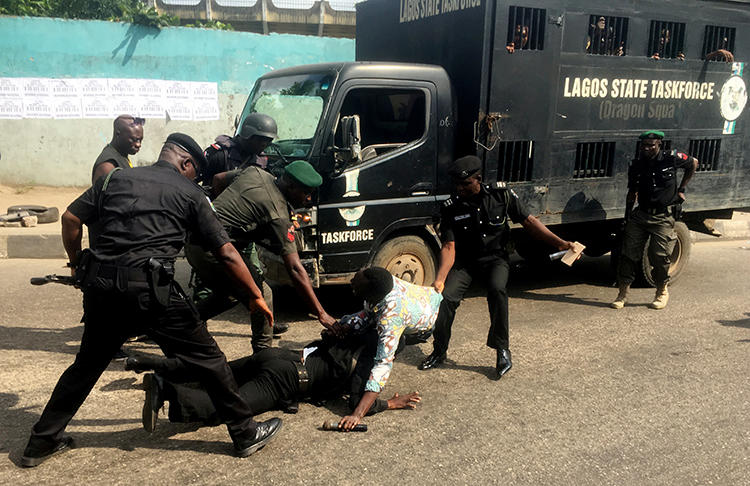On August 5, 2019, Nigerian police arrested and detained at least four journalists covering protests that took place across Nigeria in connection with the hashtag #RevolutionNow, according to journalists who spoke with CPJ and media reports.
In the morning of August 5, police in Calabar, the capital of Nigeria’s southern Cross River state, detained Jeremiah Achibong, a reporter with the privately owned CrossRiverWatch news website, and Nickolas Kalu, a journalist with the privately owned The Nation newspaper, according to the journalists, who spoke to CPJ.
Officers in the anti-cult and anti-kidnapping police force arrested the pair while the journalists were seeking information about the arrest of Ugbal Jonathan, a CrossRiverWatch reporter who participated in the #RevolutionNow protests and was detained by police earlier that day, Achibong and Kalu said.
Kalu was released in the evening of August 5, he told CPJ.
Achibong and Jonathan were released on August 7, they told CPJ, after being charged with three counts of unlawful assembly and breach of peace, according to a copy of the charge sheet seen by CPJ. They told CPJ they were granted bail with a bond of one million naira ($2,758) and a surety to provide evidence of tax payments from 2017 to 2019. A court date was originally set for August 26, but was then postponed to September 3, Achibong said.
Achibong and Jonathan were charged with breach of public peace and unlawful assembly under sections 70, 520 (6), and 249 (d) of the Cross River state criminal code; if found guilty, they could face multiple years in jail, according to the charge sheet, Achibong’s lawyer, Attah Ochinke, who spoke with CPJ via phone, and Inibehe Effiong, a lawyer who worked with a protest organizer and provided the copy of the charge sheet to CPJ.
According to Jonathan and Achibong, local police told them that the journalists’ prolonged detention and the charges stemmed from a request to the police commissioner sent by Calabar Governor Benedict Ayade. Achibong and Kalu told CPJ that the police were set to release them three hours after their initial arrests when a call came directing the officers to keep them in custody.
Agba Jalingo, the owner of CrossRiverWatch, told CPJ via phone that he believed Ayade ordered the detention of Achibong and Jonathan in reprisal for the journalists’ previous critical reporting about the governor in CrossRiverWatch.
When contacted over the phone by CPJ, Ayade’s spokesperson, Christian Ita, denied any allegations of political interference. CPJ’s repeated calls to Austin Agbonlahor, the Cross Rivers state police commissioner, and his spokesperson, Irene Ugbo, went unanswered.
Also on August 5, police officers beat and arrested Victor Ogungbenro, a video journalist with the privately owned Sahara Reporters news website, while he was covering a protest in Lagos state, according to Ogungbenro, who spoke with CPJ via phone, and a video of the attack and arrest circulated on WhatsApp, which CPJ reviewed.
Ogungbenro told CPJ he repeatedly identified himself as a journalist, but police slapped, kicked, and dragged him, and sprayed tear gas into his face. Police arrested him and held him until August 6, when he was released without charge after presenting a surety for his bail, he said.
Police also arrested Sahara Reporters journalist Tosin Ajuwon on August 5 while he was covering a protest in Nigeria’s southwestern Ondo State, according to a Premium Times report from the day and Ajuwon, who spoke via phone with CPJ.
Ajuwon said he was filming the protest when police forcefully pulled him into a van and drove him to a police station, where they detained him for several hours before releasing him without charge.
Sahara Reporters is owned by Omoyele Sowore, who was arrested on August 3 for allegedly planning the August 5 protests, according to a report by Premium Times. He remains in custody pending a police investigation, according to Sahara Reporters.
Frank Mba, a spokesperson for the Nigerian police, defended the actions of the police officers and said the incidents involving journalists covering the August 5 protests occurred because “the reporters were embedded among the protesters,” according to a report by Nigeria’s publicly funded National Television Authority posted by on YouTube. Speaking about Ogungbenro, Mba said, “The reporter in Lagos was part and parcel of the protest,” according to the same NTA report.
CPJ’s repeated calls to Mba went unanswered.
On July 22, Precious Owolabi, a reporter for the privately owned Channels TV, was shot dead while covering a confrontation between protesters and police in Abuja, Nigeria’s capital, as CPJ reported at the time.
